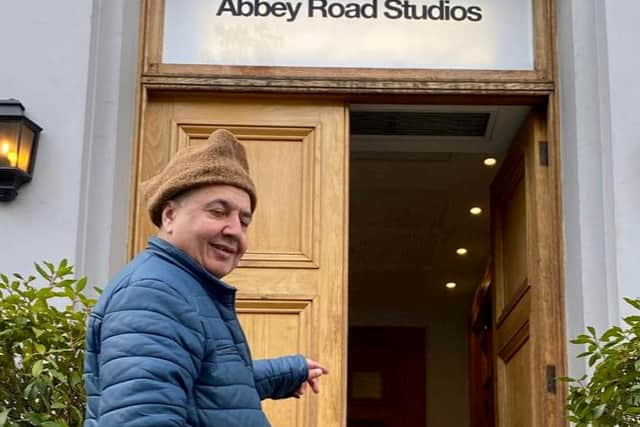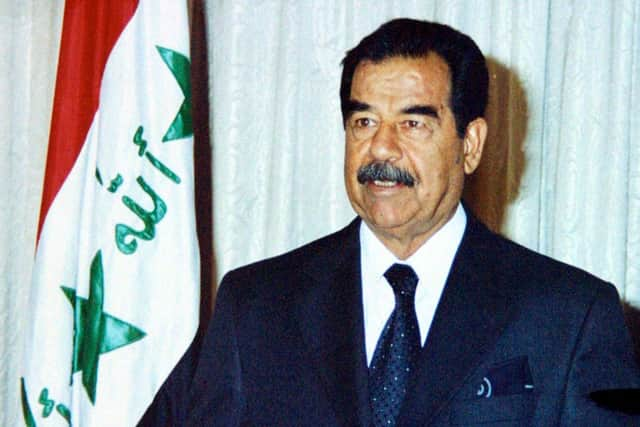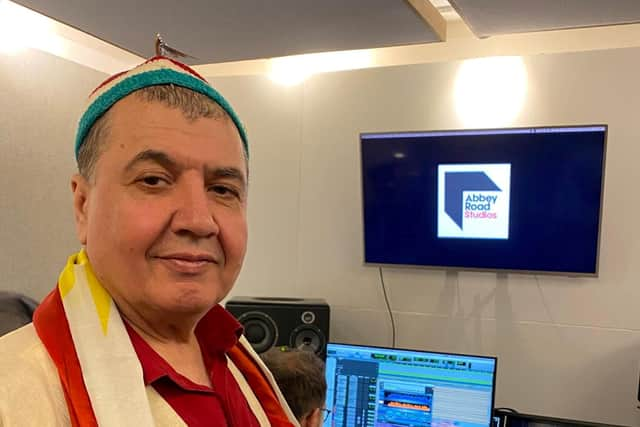Refugee from Iraq who faced execution for his songs has now recorded at Abbey Road Studios
and live on Freeview channel 276
A refugee from Iraq who faced execution for his songs has now recorded at world famous Abbey Road Studios immortalised by the Beatles.
Newroz Oremari was forced to escape Saddam Hussein’s Iraq when he was 17 after being threatened with death if he continued to sing and record revolutionary songs.
Advertisement
Hide AdAdvertisement
Hide AdNow 62, he fled the persecution in 1989 as Saddam led a genocidal campaign against the Kurds in northern Iraq.
He is originally from a town called Zakho in the Kurdistan region of Iraq.


Kurds make up around 15 to 20% of the population, but have historically been persecuted by various regimes.
During Saddam Hussein’s presidency of Iraq from 1979 to 2003, he ordered mass executions and attacks on the Kurdish people in northern Iraq, some of which involved chemical weapons.
Advertisement
Hide AdAdvertisement
Hide AdThe violent oppression forced many to flee the country in search of safety.
In protest of the oppression, Mr Oremari joined the Kurdish revolution and became a freedom fighter when he was just 17.
Mr Oremari said: “Iraq was a hell in a closed prison. Saddam and his relatives were first class criminals, murderers and thieves. They were ruling Iraq with iron and fire.
“As for Saddam’s group’s view of us as Kurds, it was unimaginably racist and fascist, because we always demanded our legitimate national and human rights, and this was considered hostility to Saddam Hussein’s regime.”
Advertisement
Hide AdAdvertisement
Hide AdHe added: “When I joined the Kurdish revolution, life was difficult, as we moved most of the time on foot and crossed the mountains, and whoever had strong mountain shoes was lucky.
“Food was scarce and medicines were not available.
“We slept and hid in the caves during the day to avoid Saddam’s army bombing us with artillery and warplanes.”


When he was at school Mr Oremari sang with a famous singer and from that moment he began recording songs.
However, with the restrictions of Hussein’s rule, he was forced to record illegally.
Advertisement
Hide AdAdvertisement
Hide AdHe used his songs to protest against the regime, which led to numerous arrests.
Mr Oremari said: “Revolutionary singing was very important for the revolution to mobilise the youth of the Kurds and join them in the revolution.
“When the politician cannot reach the hearts of the people, the revolution can reach the hearts by songs because the song is an emotional activity more than it is rational.
“With passion we can reach the hearts faster than rational political and logical speech.”
Advertisement
Hide AdAdvertisement
Hide AdIn 1989 Mr Oremari decided to make his escape, spending years in exile in Turkey, Syria and Lebanon.
Finally, he managed to reach the UK and settled in Hackney, East London.
It is here he stumbled upon the opportunity to sing at the iconic recording studio Abbey Road.
He recorded with the duo Ooberfuse, made up of Cherrie Anderson and Hal St John.
Advertisement
Hide AdAdvertisement
Hide AdThe pair have toured across the globe and invited Mr Oremari to record their new single Show Me Love.
The song puts a spotlight on the millions of people who are forced from their homes as a result of hatred towards their people.
He said: “I have an English friend who is a songwriter and playwright named Tess Berry-Hart - she is one of Hal’s friends.
“He asked Tess if she knew a good singer from the Middle East, so Tess called me, and that’s how I started working with Hal and Cherrie.”
Advertisement
Hide AdAdvertisement
Hide Ad

Since moving to the UK around 30 years ago, Mr Oremari has worked as a freelance interpreter for the Home Office and as a cultural advisor for the MOD in Iraq.
He now is a full-time singer and is forever grateful for what the UK has given him.
Mr Oremari said: “The UK gave me life, work, love, education, a passport and freedom of speech and I am grateful for that.”
For the musician, music is a powerful tool, adding: “Music means movement. Without movement there would be no sound, no music.
Advertisement
Hide AdAdvertisement
Hide Ad“Music is the sound of nature, humans and animals. We translate those sounds by many means, these sounds carry many feelings, including positive feelings and non-positive feelings.
“With music alone you can’t make peace or war, but with singing, you can.”
Comment Guidelines
National World encourages reader discussion on our stories. User feedback, insights and back-and-forth exchanges add a rich layer of context to reporting. Please review our Community Guidelines before commenting.